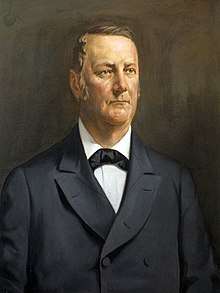John Merryman

John Merryman (August 9, 1824 – November 15, 1881) of Baltimore County, Maryland, was arrested in May 1861 and held prisoner in Fort McHenry in Baltimore and the petitioner in the case "Ex parte Merryman" which was one of the best known habeas corpus cases of the American Civil War (1861-1865). The case was immediately taken up by the United States Supreme Court and its Chief Justice Roger B. Taney, a Marylander. Merryman was also a state militia officer during the Civil War, and a Maryland politician.
Biography
Early life
Merryman began his work life as an employee in Richard Norris' hardware store in Baltimore City. The following year he moved to Guayama, Puerto Rico to work for his uncle, Samuel N. Gott. Merryman returned to Maryland in 1842 to manage farms and raise Hereford cattle. Merryman married Ann Louisa, daughter of Elijah Bosley Gittings, in 1844. John and Ann Louisa had eleven children. Merryman, a Democrat, served as member and president of the Board of County Commissioners, Baltimore County, in 1857.[1] At the outbreak of the Civil War in April 1861, he was a farmer in Cockeysville, Maryland.[2]
Civil War
Prior to the Civil War, Merryman was a 3rd lieutenant in the Baltimore County Troops. By 1861 he was a 1st lieutenant in the Baltimore County Horse Guards.[1] Following the Pratt Street Riot in Baltimore, the Maryland legislature voted against secession. However, concerned about further unrest from pro-Southern elements, they voted to keep the railways closed so Union troops could not travel through Maryland on their way to defending Washington, D.C. and other federal enclaves.[3] While carrying out this policy, Governor Thomas Holliday Hicks allegedly ordered Merryman to aid in the destruction of several bridges north of Baltimore.[1]
On May 25, 1861, Merryman was arrested at his home in Cockeysville by Union troops acting under orders of General William H. Keim. Merryman was then taken and confined in Fort McHenry.[2] Merryman petitioned for a writ of habeas corpus, which was granted, in part, by Chief Justice Roger B. Taney. Taney's May 26, 1861 order directed General George Cadwalader, commander of Fort McHenry, (1) to produce (but not release) Merryman for a hearing before Taney to be held the very next day, on May 27, 1861, and (2) to explain on what legal basis the Army had seized Merryman. General George Cadwalader did not produce Merryman. Instead, Cadwalader delivered a response which was read to the court. Cadwalader's response explained that he was acting under orders from President Lincoln, who had delegated authority to the military to suspend habeas corpus. Because Cadwalader failed to produce Merryman, Taney cited Cadwalader for contempt, and ordered the U.S. Marshal to serve an attachment order on Cadwalader. The U.S. Marshal was unable to serve the attachment order, as he was denied entrance to Fort McHenry. Thus, the contempt citation was never adjudicated. Furthermore, Taney declared Lincoln's suspension of habeas corpus unconstitutional (see Ex parte Merryman).
While Merryman was in jail awaiting a hearing, Taney had furniture and home-cooked meals brought to him in his cell. Merryman later named one of his sons Roger B. Taney Merryman in the Chief Justice's honor.[4]
Merryman was State Treasurer of Maryland from 1870 to 1872.
See also
Footnotes
- 1 2 3 Maryland State Archives
- 1 2 Toomey, Daniel Carroll. The Civil War in Maryland. Baltimore, MD: Toomey Press. p. 21.
- ↑ Nancy Bramucci Sheads (2005). "Teaching American History in Maryland – Documents for the Classroom: Arrest of the Maryland Legislature, 1861". Maryland State Archives. Retrieved April 3, 2016.
- ↑ The Politics of Continuity.
Further reading
- Baker, Jean H. The Politics of Continuity; Maryland Political Parties from 1858 to 1870. Baltimore, MD: Johns Hopkins University Press, 1973.
- Maryland State Archives. Ex Parte Merryman. Retrieved October 12, 2007 from https://web.archive.org/web/20080519134303/http://teachingamericanhistorymd.net/000001/000000/000107/html/t107.html
- McGinty, Brian. The Body of John Merryman: Abraham Lincoln and the Suspension of Habeas Corpus. Cambridge, MA: Harvard University Press, 2011.
- White, Jonathan W. Abraham Lincoln and Treason in the Civil War: The Trials of John Merryman. Baton Rouge, LA: Louisiana State University Press, 2011.
| Political offices | ||
|---|---|---|
| Preceded by Robert Fowler |
Treasurer of Maryland 1870—1872 |
Succeeded by John W. Davis |